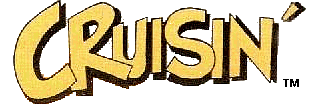The CRUISIN' history of rock and roll radio begins in 1956, one of the most exciting years in "pop" history, and to take us down this memory lane (with a beat) is Robin Seymour of WKMH, which was, when he joined it, a little-known station in Dearborn, Michigan. Robin came to the suburban Detroit station from the Armed Forces Radio Network and he brought with him a voice that mixed the warm, confidential tone of an intimate friend with the slick disc jockey rap we all know today, a blend which made him a natural for housewives and teenagers alike.Robin never had any particular ethnic identification or allegiance - but the "Bobbin' with Robin Show" quickly found its audience, as he constructed a bright, orderly program that featured (almost exclusively) the records listed on the sales charts printed by the music press. He also was among the first of the nation's deejays to ask his listeners what they thought about new records, and hosted some of the earliest sock hops and commercial tie-ins with local record stores. In 1953 he was named "Disc Jockey of the Year" by Billboard, the music trade magazine. The following year he was given the same title by another publication, Hit Parader.
1956: President Eisenhower underwent an operation to relieve blockage of the small intestine due to ileitis, but physicians said he would be physically fit to run for re-election. Scientists said radiation was a peril to the future of humanity. Egypt seized the Suez Canal and the United Nations established the first international police force on the Sinai Peninsula. The first trans-Atlantic telephone cable system went into effect. The Hungarians revolted. Six Marine recruits were marched into a stream at Parris Island and drowned. The Andrea Doria sank off the coast of Massachusetts. And Elvis Presley and the spread of rock and roll nearly pushed everything else in this list of news stories right out of the conversation.
This was the year Elvis recorded Heartbreak Hotel, Don't Be Cruel, Hound Dog and perhaps half a dozen other million-selling songs. The first of these (Hotel) appeared in the number one position at the end of April and that song or another by Elvis occupied the same lofty spot twenty-five of the year's remaining thirty-six weeks.
1956 was the year "rock 'n' roll" became an angry epithet, blamed by psychiatrists and religious leaders (not to mention thousands of parents) for the rise in juvenile delinquency; some even said it was all a part of some Communist plot. Elvis and his pack of noisy imitators were called obscene and there were real riots at dozens of concerts. There were non-rockers on the record charts, to be sure, but it was Carl Perkins' blue suede shoes and Bill Haley's alligator that became a part of the New Culture, not Gogi Grant's wayward wind and Morris Stoloff's picnic. The war babies had come to teen-age.
Most adults in '56 thought it was a fad and that "it" would go away. Most radio listeners believed otherwise.
There were a number of rock giants on the popular music charts in 1956 and many had made their abrupt and rhythmic appearance there after serving an apprenticeship in the ghetto called rhythm and blues. One of the best of these was Chuck Berry, who had given up hairdressing for songwriting, guitar playing and singing, making his cross-over into the pop charts in 1955 with Maybelline. Quickly, Berry came to be accepted as someone who understood, someone who wrote and sang about girls and cars and school and music the way the record-buyer thought. The title here, Roll Over Beethoven, tells what the song is about; Berry's titles usually did.
There was a concerted effort to put the teen-age stamp on everything this year. Enter: The Teen Queens, a duo that sang Eddie My Love, one of the many youthful laments.
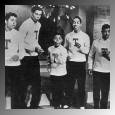 A second "teen" group was that supporting Frankie Lymon, the Teenagers, a swarm of young vocalists from Harlem and the Puerto Rican barrio in New York. Frankie was thirteen in 1956 and Why Do Fools Fall In Love was his first record. It sold millions.
A second "teen" group was that supporting Frankie Lymon, the Teenagers, a swarm of young vocalists from Harlem and the Puerto Rican barrio in New York. Frankie was thirteen in 1956 and Why Do Fools Fall In Love was his first record. It sold millions.
For years white singers had been "covering" R&B songs, homogenizing them for the white market. Slowly, as the audience got younger, the sound got closer to the original...and then the Mello Kings became the first white group to have a hit on a R&B label (Herald) and to be regarded as black by most blacks. Their '56 hit was Tonite, Tonite. They sounded black, but they were from Westchester, which wasn't.
(One of the leading white "cover" groups was the Crew Cuts, on this CRUISIN' volume singing a Budweiser comercial. It was, for the Crew Cuts, an original.)
There were a number of covers of Robin's next record, Fever, sung by Little Willie John, another refugee from R&B. Fever was written by Eddie Cooley and John Davenport - "Davenport" actually being Otis Blackwell, who wrote a number of hits that year for Elvis. Little Willie John was another of the year's gold record winners.
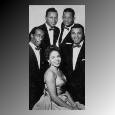 When Buck Ram (who became the group's manager as well as principal songwriter) organized the Platters, most of them were parking lot attendants in Los Angeles. A short time later they were stars. Only You was a smash in '55 and in '56 they proved they weren't a one-record group with The Great Pretender.
When Buck Ram (who became the group's manager as well as principal songwriter) organized the Platters, most of them were parking lot attendants in Los Angeles. A short time later they were stars. Only You was a smash in '55 and in '56 they proved they weren't a one-record group with The Great Pretender.
Even the harshest critic of rock had to be enchanted by Little Richard's big hit of the year, the song whose lyrics began with a shout: "A-wop-bop-a-lu-bop-a-wop-bam-boom!" The immortal Tutti Frutti. Little Richard (Penniman) was a tall, thin, flashy, pompadour'd black man who had been raised by a white woman in Macon, Georgia, and made his mark as some kind of Rock Celebrant, a performer who outraged his audiences and destroyed his pianos. One of the true classics. "Tutti Frutti/Awwwww rootie..."
One of the family-owned R&B companies was Modern, organized in 1945 by the Bihari brothers of Los Angeles and known for a superb talent roster that included Etta James, Jimmie Witherspoon, John Lee Hooker,
B. B. King and the Cadets, whose Stranded in the Jungle was a hit in 1956. Originally it had been recorded by the Jayhawks.
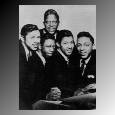 Expensive cars and fast motorcycles were important in the early days of rock, providing inspiration for hundreds of songs as well as names for several top groups. One of these was the Cadillacs - others included the El Dorados, the Imperials, the Impalas, the Continentals - and the title of their hit was, appropriately, Speedo. Except in this case it referred not to one of the vehicles produced in their home town (Detroit) but the hero of the song, who earned the nickname by being adept at attracting and snaring girls.
Expensive cars and fast motorcycles were important in the early days of rock, providing inspiration for hundreds of songs as well as names for several top groups. One of these was the Cadillacs - others included the El Dorados, the Imperials, the Impalas, the Continentals - and the title of their hit was, appropriately, Speedo. Except in this case it referred not to one of the vehicles produced in their home town (Detroit) but the hero of the song, who earned the nickname by being adept at attracting and snaring girls.
 There were even more bird groups than car groups - the Cardinals, the Robins, the Penguins, the Wrens, the Meadowlarks, the Ravens, the Flamingos, the Orioles, the Crows. The latter's hit of the mid-fifties was Gee, recorded in 1954 and regarded as one of the first rock smashes. In '56 it was an "oldie."
There were even more bird groups than car groups - the Cardinals, the Robins, the Penguins, the Wrens, the Meadowlarks, the Ravens, the Flamingos, the Orioles, the Crows. The latter's hit of the mid-fifties was Gee, recorded in 1954 and regarded as one of the first rock smashes. In '56 it was an "oldie."
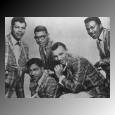 The Five Satins were middle Fifties New York R&B personified, the product of a climate which ahd four or five singers and handclappers standing on nearly every street corner in the city. They were big favorites at the Brooklyn Paramount where Alan Freed was holding weekend jubilees and the group's hit was In The Still Of The Night.
The Five Satins were middle Fifties New York R&B personified, the product of a climate which ahd four or five singers and handclappers standing on nearly every street corner in the city. They were big favorites at the Brooklyn Paramount where Alan Freed was holding weekend jubilees and the group's hit was In The Still Of The Night.
Long before recording Honky Tonk, Bill Doggett was the Ink Spots' pianist and arranger and after that he'd worked with Louis Jordan and
Lionel Hampton and accompanied Ella Fitzgerald on three of her albums. In '56 he was forty years old and probably much surprised to find himself a pop star, but Honky Tonk was earthy, raunchy and danceable, thus it was a natural in the cause of teen-age liberation.
That's what 1956 was: the teen-age 1776. There'd been rumblings earlier, but this year all the lines were drawn.
- Jerry Hopkins.
CRUISIN' THE FIFTIES & SIXTIES: A History of Rock and Roll Radio. Conceived and recreated by: Ron Jacobs/Production and Research: Ellen Johnson and Jere Alan Brian/Engineering: John Horton/Art Direction: Paul Gruwell/Cover Art: Mike Royer/All selections are the original performances as released on the following labels: Chess: Chuck Berry/Columbia: The Four Lads/Ember: The Five Satins/Gee: Frankie Lymon & the Teenagers/Herald: The Mello Kings/Jubilee: The Cadillacs/King: Little Willie John, Bill Doggett/Mercury: The Platters/Modern: The Cadets/Rama: The Crows/R.P.M.: The Teen Queens/Specialty: Little Richard/Special thanks to: Frank Maruca, WKNR Radio. Produced by Increase Records, a division of Watermark, Inc., Los Angeles, California. ©1970 Increase Records.
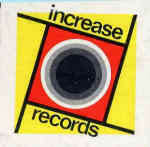
Back to the

index.
